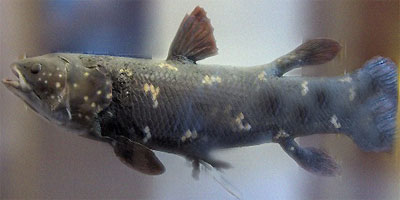Rare coelacanth captured in Indonesia
Rare coelacanth captured in Indonesia
May 20, 2007
An Indonesian fisherman caught a coelacanth, a species so ancient it is called a “living fossil”, off the coast of Sulawesi, Indonesia, according to the Associated Press. The fisherman managed to keep the specimen alive for 17 hours in a pool before it expired.
The coelacanth was believed extinct since the age of the dinosaurs until an individual was captured off the coast of Southern African in 1938. Since then the fish has been found along the south-east African and in Indonesia, The species is notable for its heavy body armor and prehistoric appearance.
Generally found at depths exceeding 300 feet (90 m), coelacanths occasionally show up in fish markets in Africa and Indonesia, usually captured as by-catch by fishermen seeking deepwater species. The fish are believed to be sexually mature at 20 years and live to 80-100 years old.

Latimeria chalumnae |
There are two recognized species of coelacanth, the “blue” species (Latimeria chalumnae) from the Indian Ocean off the coast of Africa and the “brown” species (Latimeria menadoensis) from Indonesia. The Indonesian species was first scientifically described in 1999 and has only been documented on a handful of occasions.
The Indonesian fisherman who caught the fish is named Justinus Lahama. The coelacanth measured 1.3 meters (four feet) long and weighted 50 kilograms (110 pounds).
This report used information from the Associated Press.
Related articles
Unusual prehistoric shark beast captured in Japan. A rare frilled shark was captured live by fishermen off the coast of Japan. The toothy eel-like creature was taken to Awashima Marine Park in Shizuoka where it later died according to Reuters.
Photos of world’s largest squid. Fishermen in New Zealand may have captured the largest Colossal squid ever recorded. It may be the first time a Colossal squid has been seen alive. The beast, weighing 450 kilograms (990 pounds), was eating a Patagonian toothfish (Chilean sea bass) hooked by fishermen when it was captured in the deep, frigid waters in the Ross Sea near Antarctica. The squid was reported to be 10 meters (33 feet) in length and took more than two hours to land.
Slurp gun used to capture hermaphrodite from hydrothermal vent. Researchers used an “Alvin Slurp Gun” to capture a hagfish from a deep sea hydrothermal vent. It is the first time that a member of the jawless fishes (agnathans) have been captured from a hydrothermal vent site. The results are published in the current edition of the journal Biology Bulletin.







